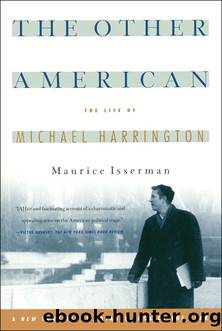The Other American the Life of Michael Harrington by Maurice Isserman

Author:Maurice Isserman
Language: eng
Format: epub
ISBN: 9780786752805
Publisher: PublicAffairs
CHAPTER NINE
Socialists at War, 1965â1972
One reason the kids donât listen to us or listen only with contempt is precisely because in our concern to be politically effective we have spoken lies and left truth to the poets.
_________
David McReynolds
November 30, 19671
In the late winter of 1965 President Lyndon Johnson dramatically increased the scope of American commitment to the war in Southeast Asia, first by ordering American warplanes to undertake a sustained bombing campaign against North Vietnam, and then by sending the first openly designated U.S. ground combat forces to South Vietnam. By the end of 1965, there would be nearly 200,000 Americans in Vietnam, with hundreds of thousands more on the way.
Contrary to the legends that would later spread on the Left, Michael opposed the war, and from its beginning.2 That the Socialist Party would do so as well seemed a foregone conclusion. Socialists, after all, had a long history of antiwar opposition, most proudly represented by memories of Eugene Debsâs thundering condemnation of the First World War. That tradition had fallen on hard times by the 1950s, but it had never completely died out. In the early 1960s it seemed to be reviving. Socialists had endorsed and joined the first small public protests against the war in Vietnam in 1963. The following year, the SPâs election platform declared that âunder no circumstances should men and money be invested further in war in Southeast Asia.â3
Within weeks of Johnsonâs initial escalation of the war, a mass antiwar movement sprang up around the country. In March there were teach-ins against the war at the University of Michigan and at dozens of other campuses across the country. In April SDS staged the first major anti-Vietnam War demonstration in Washington, D.C. Local antiwar organizing committees sprang up in big cities and college towns across the country and made the first tentative efforts to forge a national coalition.
Michael accurately described the antiwar movement in these early months as âinchoate and without structure, but drawing upon deep sentiments of moral idealism.â4 Revolutionaries and reformists, Communists and Trotskyists, radical and religious pacifists, New Leftists and others may have been convinced that they and they alone were in possession of the proper formula for opposing the war. But with all the jockeying for position and influence that went on in those early days of the antiwar movement, none gained a dominant position. The movement against the war proved so ideologically diverse, and so geographically dispersed, that no single political group could possibly have determined its character and outlook. âCoalitionâ may have become a dirty word among certain sections of the Left, where it was used to describe a politics dependent on retaining the goodwill of a Lyndon Johnson or a George Meany. But the antiwar movement itself proved one of the most genuine and successful coalition efforts ever launched by American radicals.
Michael spoke out against the escalation of the war in early April 1965, predicting in a column for the New York Herald Tribune that the âfate of Appalachia may well be determined in the jungles of Viet Nam.
Download
This site does not store any files on its server. We only index and link to content provided by other sites. Please contact the content providers to delete copyright contents if any and email us, we'll remove relevant links or contents immediately.
The Secret History by Donna Tartt(19092)
The Social Justice Warrior Handbook by Lisa De Pasquale(12191)
Thirteen Reasons Why by Jay Asher(8912)
This Is How You Lose Her by Junot Diaz(6889)
Weapons of Math Destruction by Cathy O'Neil(6281)
Zero to One by Peter Thiel(5802)
Beartown by Fredrik Backman(5759)
The Myth of the Strong Leader by Archie Brown(5509)
The Fire Next Time by James Baldwin(5448)
How Democracies Die by Steven Levitsky & Daniel Ziblatt(5219)
Promise Me, Dad by Joe Biden(5154)
Stone's Rules by Roger Stone(5088)
A Higher Loyalty: Truth, Lies, and Leadership by James Comey(4964)
100 Deadly Skills by Clint Emerson(4927)
Rise and Kill First by Ronen Bergman(4790)
Secrecy World by Jake Bernstein(4753)
The David Icke Guide to the Global Conspiracy (and how to end it) by David Icke(4720)
The Farm by Tom Rob Smith(4514)
The Doomsday Machine by Daniel Ellsberg(4490)
